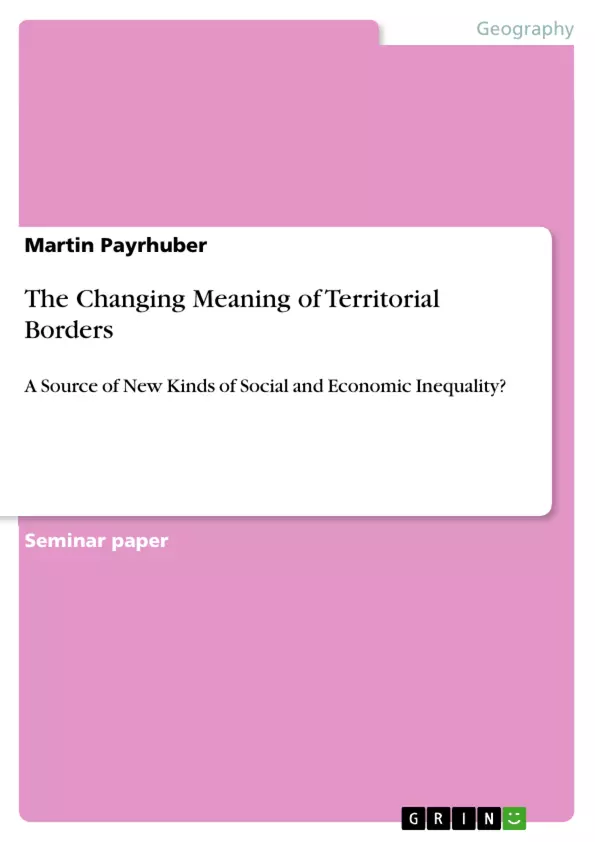Amin points out that it is odd that the mainstream view of cities and regions is still one of territorial entities, although recent developments have been “transforming cities and regions into sites immersed in global networks of organization and routinely implicated in distant connections and influences”. These developments have become known as globalization and were they reason why spatial configurations (e.g. territorial borders) are no longer necessarily territorial or scalar, because “the social, economic, political and cultural inside and outside are constituted through the topologies of actor networks which are becoming increasingly dynamic and varied in spatial constitution” (Amin). This paper intends to outline the circumstances and consequences of the development identified by Amin in terms of the creation of new forms of inequality and disparity. The first part deals with definitions in the realm of borders and boundaries, the second part treats the historical, current and future meanings of borders and the third part draws the connection between borders and inequality.
Table of Contents
- Introduction
- Definitions
- Static Boundary Classifications: Antecedence vs. Subsequence
- Functional Boundary Classifications: Open vs. Closed
- The Meaning Of Borders
- Artificial and Natural Borders
- The Necessity of Borders
- The Future of Borders: the Changing Meaning
- The Complexity of Borders
- Wishing Boundaries Away?
- Borders Are Everywhere
- Borders and Inequality
- Inequality Through Migration
- Global Cities
- Theory of Fragmenting Development
- Gated Communities
- Problems of Inequality and Possible Solutions
- Conclusion
Objectives and Key Themes
This paper explores the evolving nature of territorial borders in a globalized world and investigates how these changes may contribute to new forms of social and economic inequality. The author examines the changing meaning of borders, analyzing their historical, current, and future implications.- The changing meaning of territorial borders in a globalized context
- The relationship between borders and inequality
- The role of globalization in shaping the nature of borders
- The impact of migration and spatial segregation on inequality
- The potential for new forms of social and economic disparity
Chapter Summaries
- Introduction: This chapter introduces the paper's main argument, which focuses on the shifting nature of borders and their potential role in creating new forms of inequality. The author references Amin's concept of global networks and how spatial configurations are becoming increasingly dynamic.
- Definitions: This chapter establishes the conceptual framework by defining key terms like "border", "boundary", and "frontier". The author clarifies the distinctions between these terms and their usage in the text.
- Static Boundary Classifications: Antecedence vs. Subsequence: This chapter explores the classification of boundaries into antecedent (created before settlement) and subsequent (imposed after settlement). The author discusses the implications of these types of boundaries for migration, integration, and social and economic inequality.
- Functional Boundary Classifications: Open vs. Closed: This chapter delves into functional boundary classifications, examining the levels of contact or separation between people and states across borders. The author highlights the importance of this concept for economic analysis, particularly in the context of European integration.
- The Meaning of Borders: This chapter examines the historical, current, and future meanings of borders. It discusses the role of natural and artificial borders and explores the complex nature of boundaries in a globalized world.
- Borders and Inequality: This chapter focuses on the connection between borders and inequality, exploring how borders can contribute to inequality through migration, global cities, and gated communities. The chapter also discusses theories of fragmenting development.
Keywords
The main focus of this paper lies on the changing meaning of territorial borders in a globalized context and the potential for these changes to create new forms of social and economic inequality. Key terms include: borders, boundaries, frontiers, globalization, migration, spatial segregation, inequality, gated communities, global cities, fragmenting development.Frequently Asked Questions
How is globalization changing the concept of territorial borders?
Globalization is transforming cities and regions into sites immersed in global networks, meaning spatial configurations are no longer strictly territorial or scalar, but constituted through topologies of actor networks.
What is the difference between antecedent and subsequent boundaries?
Antecedent boundaries are created before significant settlement, while subsequent boundaries are imposed after a cultural landscape has already developed, often impacting migration and social integration.
How do borders contribute to social and economic inequality?
Borders can create inequality through restricted migration, the formation of 'global cities' that exclude certain populations, and the rise of gated communities that segregate social classes.
What are 'functional boundary classifications'?
These classifications distinguish between 'open' and 'closed' borders, focusing on the level of contact, separation, or economic integration between states and people across those borders.
What is the 'theory of fragmenting development'?
This theory, discussed in the paper, explores how globalization leads to uneven development where certain areas are highly connected to the global economy while others are left behind.
Are borders disappearing in a globalized world?
The paper argues that while some wish boundaries away, borders are actually "everywhere," becoming more complex and varied in their spatial and social constitution.
- Quote paper
- Mag. phil. Martin Payrhuber (Author), 2014, The Changing Meaning of Territorial Borders, Munich, GRIN Verlag, https://www.grin.com/document/271187



